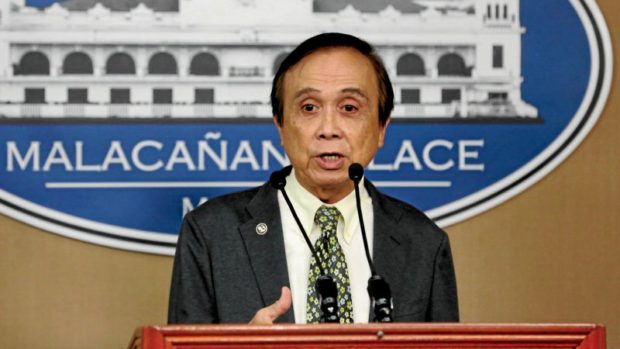
Socioeconomic Planning Secretary Ernesto M. Pernia (File photo by JOAN BONDOC / Philippine Daily Inquirer)
CAGAYAN DE ORO CITY—A possible extension until yearend of the implementation of martial law in Mindanao amid continuous fighting in Marawi City is not expected to widely disrupt business and economic activity in the island, the country’s chief economist said Tuesday.
“I think there’s no consequential disruption of businesses in Mindanao; life seems to be going quite normal. Even Cagayan de Oro, which is quite close to Marawi, doesn’t seem to be affected by what’s going on there. It’s business as usual,” Socioeconomic Ernesto M. Pernia told reporters on the sidelines of the launch of the Northern Mindanao Regional Development Plan 2017-2022, when asked about President Rodrigo Duterte’s plan to extend martial law in Mindanao.
“In fact, martial law is also an environment that will make people safe—they will feel safe about going about their business. It’s not really a hindrance; it’s more of ensuring people that their lives and businesses are not in danger,” added Pernia, who heads state planning agency National Economic and Development Authority.
READ: World Bank: Fixing Mindanao economy key to PH progress
Asked if an extension of martial law meant that the government was unable to immediately resolve the conflict, Pernia said the government “just wanted to be sure that no stone is unturned.”
“The purpose is to make sure there is no uprising in other areas of Mindanao,” Pernia explained.
On Tuesday, presidential spokesperson Ernesto Abella said President Duterte already asked Congress to extend martial law in Mindanao until Dec. 31, as the 60-day implementation that started on May 23 is about to lapse.
READ: Duterte wants martial law in Mindanao extended until end of 2017
As for the reconstruction and rehabilitation of Marawi City, Pernia said that besides the allocation in the national budget, a number of foreign countries offered financial assistance, including Australia, China, Japan and the United States.
“European countries are also coming in to help,” Pernia added.
Also, the foundation of tycoon Lucio Tan expressed intention to help in housing rehabilitation, an example of private sector participation in reconstructing the city, the Neda chief said.
“There’s going to be many forms of support,” he said.
RELATED VIDEO

